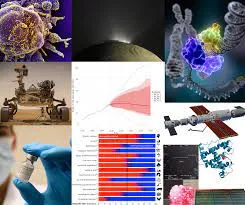What are the most prominent scientific events expected in 2022?
Many scientific events in 2022 coincide with his declaration of the Year of Basic Sciences and are expected to contribute to achieving new steps for humanity towards progress, raising health and environmental challenges, and further understanding the universe. Here are the most prominent ones.
2022 International Year of Basic Sciences
Aghia Academy of Sciences an Arab-German bridge to support scientific research
COVID-19 has claimed millions of lives, and without the results obtained over decades in basic scientific research, the global situation would have been much worse. Therefore, the United Nations designated the New Year as the “International Year of Basic Science for Sustainable Development”, with the aim of shedding light on the links between basic science and the Sustainable Development Goals.
Without basic science, we would not know that the infection is caused by a virus, nor what it looks like and its genetic sequence, according to the official website of the International Year of Basic Sciences ; Basic science is the source of tests, treatments, vaccines, epidemiological modeling, and everything that helps us fight an epidemic and its consequences. The pandemic has served as a reminder of our reliance on basic science to ensure the balanced, sustainable and inclusive development of the planet.
A new generation of vaccines against corona
According to a report by the scientific website "Nature", in the new year, scientists will focus their efforts on understanding the impact of the latest mutated "Omicron" of the rapidly spreading Corona virus, and the threat it poses. Meanwhile, researchers will work to produce the next generation of vaccines designed to protect against the rapidly evolving coronavirus.
Next year could see the development of mRNA vaccines that target specific variants, and others that use new technologies to fight the virus, such as protein-based ones - some of which have been used for decades against diseases including hepatitis - or that rely on DNA. It does not require cold storage and can be a good alternative for low-income countries.
A new push for particle physics
After a hiatus of several years and extensive maintenance work, the Large Hadron Collider is scheduled to resume operations at the European Laboratory for Particle Physics (CERN) near Geneva, Switzerland, in June.
The three main components of the collider have been upgraded and expanded with additional layers of sensors, which will make it possible to collect more data from the 40 million proton collisions produced by each of these components every second.
After completing the technical preparations, the four gravitational wave detectors in the world - one in Japan, one in Italy, and two in the United States - will begin a new observation tour in December to reveal new secrets of the universe.
Missions to the Moon and Mars
A large fleet of probes and landers is scheduled to leave for the Moon in 2022, according to Nature, too; It will launch the orbiter "ARTEMIS 1" (Artemis I) NASA's first test of the system at all , which aims to re - astronauts to the moon, while the probe will be " Capstone " (CAPSTONE) of the Agency experiments to test elliptic orbit around the moon.
For its part, India will seek, as part of its third lunar mission, "Chandrayaan-3" - to be the first vehicle to make a smooth landing (without harming the vehicle) on the moon with its own rover in the third quarter of the year.
Japan will also attempt to achieve its first smooth landing on the moon's surface, with the SLIM mission. Russia, for its part, is working to revive the glory of the Soviet lunar program with the Luna 25 lander.
Mars will also be a favorite destination for sending spacecraft in the new year. For example, the European Space Agency's "Rosalind Franklin" probe is expected to launch to the red planet next September as part of the joint European-Russian ExoMars mission, Where you will look for signs of life in the past.
Saving biodiversity
Having failed to meet the Aichi Biodiversity Targets - set in 2010 - by the 2020 deadline, international parties are expected to work on a new set of targets to slow biodiversity loss during the next meeting of signatories to the United Nations Convention on Biological Diversity. In Kunming, China, from 25 April to 8 May.
Habitat loss and other factors linked to human activity have put an estimated one million plant and animal species at risk of extinction.
Tags:
cambridge science
electrical sciences
genomic sciences
geosciences
life science
live science
neuroscience
science
science magazine
space science
strait of science



